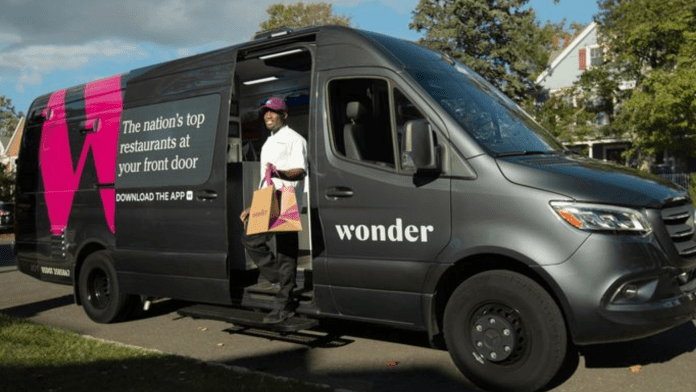The food-delivery startup Wonder Group has received a financial boost from Nestle, as it aims to offer cutting-edge kitchen equipment and pre-prepared ingredients to a range of businesses, including hotels, hospitals, and sports arenas.
Sources with knowledge of the matter, who preferred to remain anonymous due to the undisclosed financial terms, have revealed that the agreement encompasses a $100 million investment from Nestle, coupled with a strategic partnership.
Nestle and Wonder have officially acknowledged the agreement while opting not to disclose the specifics of the transaction.
This funding brings Wonder one step closer to realizing its goal of simplifying the process of providing high-quality home-cooked meals for busy families, making it more convenient and affordable. Founded in 2018 by serial entrepreneur and former Walmart e-commerce chief Marc Lore, the startup had a valuation of approximately $3.5 billion following a $350 million funding round in June.
Recently, Wonder secured an agreement to purchase the meal-kit company Blue Apron for $103 million. Additionally, the company has created kitchen equipment designed to streamline and expedite the preparation of restaurant-quality dishes.
Before founding Wonder, Lore established and successfully sold the e-commerce startup Jet.com to Walmart for $3.3 billion in 2016. Despite Walmart ultimately discontinuing Jet, Lore played a key role in spearheading the retail giant’s extensive foray into the online marketplace and its relentless pursuit to narrow the gap with Amazon, ultimately departing from Walmart nearly three years ago.
Lore, who co-founded Quidsi, the parent company of Diapers.com, sold the business to Amazon.
During an interview with CNBC, Lore expressed that collaborating with Nestle will enable Wonder to accelerate its expansion at a faster pace.
Nestle, a major player in the food and beverage industry, produces ingredients, snacks, and frozen meals available in retail stores. Additionally, they have a substantial presence in the food-service sector, serving clients like college campuses and cruise lines. According to Lore, there is potential for some of these businesses to express interest in Wonder’s kitchen equipment.
The collaboration is set to initiate with Nestle producing tailored pizza and pasta for use with Wonder’s kitchen equipment, in addition to offering the equipment for sale to clients.
Melissa Henshaw, who serves as the President of Nestle’s out-of-home division, explained that numerous clients of Nestle have encountered challenges in keeping up with evolving customer preferences for convenient meals and more robust flavors. However, many of these businesses have faced staffing shortages, which has compelled them to implement measures that reduce sales opportunities and leave customers dissatisfied. This includes reductions in the variety of items on room service menus in hotels, restricted hours at cafes, and the delivery of lackluster, limp, or cold food.
“With our partnership with Wonder, there’s this opportunity to help operators across multiple out-of-home segments be able to improve their food quality, have consistency, and actually open up some additional revenue streams that have been pretty challenged post-pandemic,” she said.
Initially, Wonder adopted a distinct business model involving a fleet of trucks equipped with mobile kitchens that would park and prepare meals right outside customers’ homes in the suburban regions of New Jersey and New York. However, in a strategic shift to achieve profitability more rapidly, the company abandoned this approach in January and had to make the difficult decision to lay off hundreds of employees.
Rather than continuing with its previous approach, the startup shifted its focus towards establishing an expanding series of physical kitchens. These kitchens enable the preparation of diverse menu items spanning various cuisines typically associated with restaurants boasting significant popularity or associated with celebrity chefs like José Andrés, Bobby Flay, and Michael Symon. Wonder has acquired rights from an increasing array of these chefs and restaurants, enabling customers to mix and match their orders. This innovation allows diners the flexibility to select entrees from different restaurants for various family members within a single order.
As of now, the company employs approximately 1,100 individuals.
By the end of the year, Wonder aims to establish 10 locations within the tri-state area encompassing New York, New Jersey, and Connecticut. Each of these locations will offer around a dozen seats for on-site dining, although the majority of orders are expected to be for delivery or pickup for at-home dining, according to Lore. In the following year, the company plans to expand further by opening at least 20 additional locations.
In its latest initiative, Wonder is actively marketing its white-labeled technology along with specially crafted and prepared meal ingredients to other businesses. The company has introduced its business-to-business offering, named WonderWorks, across 50 locations, including convention centers, theaters, and airports.
In the long run, Lore envisions Wonder as a comprehensive “super app for mealtime,” offering a range of tiered options tailored to customers’ budgets, dietary preferences, and schedules. These choices would encompass meal kits from Blue Apron and freshly prepared hot meals from its own kitchens.
Wonder competes with a variety of contenders in the food sector, including delivery companies like Uber Eats and DoorDash, quick-service restaurants such as SweetGreen and Chipotle, and even grocery chains like Kroger and Amazon-owned Whole Foods, which have expanded their offerings of prepared food.
Wonder aims to set itself apart through its innovative food preparation methods. This approach allows the company to create an extensive range of dishes and enhance the flavor of menu items, even within the constraints of a modest 2,800-square-foot kitchen with minimal equipment and labor.
“There’s no gas,” Lore said. “There’s no stove. There’s no fire. There’s no hoods. There’s no grease traps. This can go into a shoe store, a yoga studio or LensCrafters. It can go in anywhere. So it allows you to be very, very adaptable with the kitchen.”





